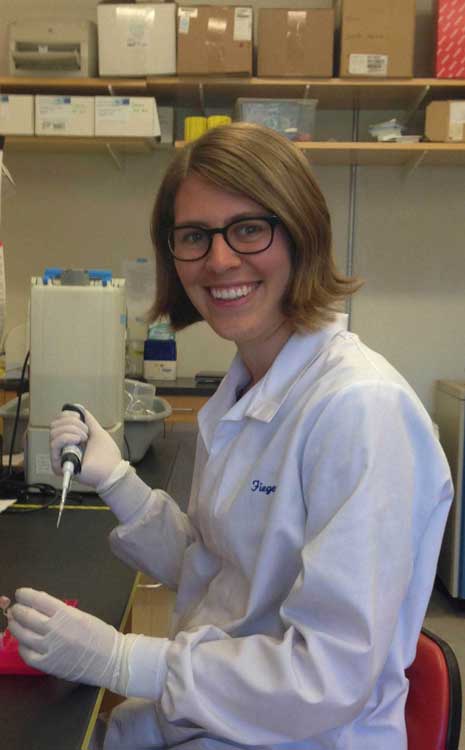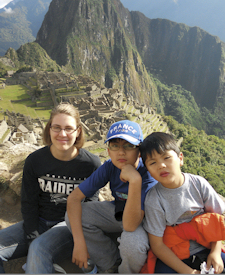
Alumni Spotlight: Ann Fiegen Durbin
Dec 30, 2018
Ann Fiegen Durbin believes in the importance of little things.
For the last six years, she's been huddled in a lab, probing the secrets of the tiny RIG-I protein, a substance inside the cell that acts as a kind of mini-security guard against infection. How, she wondered, does a cell detect an invading virus once it's already inside? How does it know when it's infected and when to tell the immune system to start fighting back?
These and other nagging little questions with the potential for big payoffs led Durbin, a 2010 Biology graduate who in 2014 married 2010 graduate Will Durbin, down a path as a PhD candidate in virology at Harvard University, where she finally completed her dissertation and defense in April. Looking back, she says it wasn't so bad. And the best part is she's now ready to go to work, she hopes, in the pharmaceutical industry where new infection-fighting drugs are being developed.
Her path to discovering the importance of big and little began at Xavier in 2006. It's where she learned that all the details matter-even down to how she executes calculations in her notebook.
"So much of who I am and how I approach my work is rooted in my habits I formed at Xavier and through all my education," she says. "This connection between the small and big picture is important and it plays out not just in biology, but in many aspects of your life."

Durbin also sees a connection between her passion for science and Xavier's Jesuit heritage and social justice mission.
"It was very influential," she says. "I wanted to contribute to human knowledge, and I was excited to do my PhD where I could learn more and pioneer new insights into pathogens and viruses and how they impact human health."
{pullquote text="So much of who I am and how I approach my work is rooted in my habits I formed at Xavier and through all my education." float="right"}
Durbin began calculating her future after coming to Xavier from Roseville, Minn. Her freshman biology professor spotted her talent for science and encouraged her to think about going into research instead of medicine. With encouragement from her professors, she applied for and landed a research internship the summer after her sophomore year at the Mayo Clinic in Rochester, Minn., where she explored neurological damage and healing. The next summer, she won a spot at Harvard and studied the Human papilloma family of viruses.
Both experiences convinced her to specialize in infectious diseases with a focus on improving public health systems in developing countries. She credits her toughest-and favorite-biology courses, Virology and Parasitology with Jen Robbins, PhD, for honing her interest.
"We would talk in class about viruses in every facet-how they replicate themselves, how they spread from cell to cell, human to human, how our health systems break that cycle and where they fall short, and how does the makeup of a virus impact sociology and immunology," she says.
Her final summer stop was Peru. In her senior year, she won a coveted Brueggeman Fellowship, which sends students on independent research projects to locations around the world, and used it to research public health systems in the developing country. She interned in the research lab of the National Institute of Health in Peru and stayed with the family of the institute's director in Lima.

So after graduating in May 2010, Durbin spent eight weeks in a lab in Lima in a country struggling with poverty and a poorly funded public health system. Her lab work, detecting Dengue virus and Yellow Fever virus in human blood samples, helped define where outbreaks of disease were occurring so that treatment and prevention could be focused on those areas.
She toured famous sites like Machu Picchu. But she also visited a remote public health center in the Amazon region. She went in by plane to reach the old outpost and observed their work testing human tissue samples and water and food supplies for the region.
"They had very poor facilities," Durbin says. "They were in the middle of the Amazon where it's above 80 to 90 degrees year-round and extremely humid, and most of the buildings did not have air conditioning or an autoclave to sterilize equipment. They had to hand-wash lab tools with soap, water and bleach."
After Peru, she entered Harvard's PhD program, applying what she learned in Lima to her study of infectious diseases. In her dissertation, she concluded that the security guard protein, RIG-I, detects the chemical stamps or 'modifications' on the cell's own RNA, but that the viral RNA lacks. The protein alarms the immune system when it bumps into unstamped viral RNA in the cell, alerting the rest of body to the viral infection.
Durbin's findings contribute to a growing body of knowledge about how viruses are detected in the immune system.
Now she plans on working for a diagnostics company developing new lines of blood tests that can detect diseases like Dengue fever, Ebola and the Zika virus and are more affordable than traditional diagnostics.
New "rapid test" designs can be used in resource-poor settings that lack electricity and refrigeration, like the Amazon outpost in Peru, so that sick people in rural areas get their results and treatment immediately, instead of waiting days or weeks for test results from the diagnostics laboratory in the capital city.
"My time in Peru drove home how connected these concepts are," she says. "That was really sobering-the people trying so hard to take care of the public health of the entire province, and they're so severely compromised by the resources available."